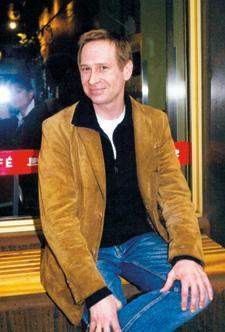Twenty-five years after comedy troupe Kids in the Hall made its first foray onto the stage comedian Scott Thompson is more committed than ever to his work and to saying the things no one else can. He sat down with fellow comedian Elvira Kurt last year to reflect on his past and future. The following is an edited excerpt from that videotaped conversation.
ELVIRA KURT: Your character Buddy Cole was around right from the beginning. Were you doing him even before Kids in the Hall?
SCOTT THOMPSON: No, but it was the first character that I did with them.That was in the ’80s when everybody was dying around us. I’m just about ready to come out and have tons of sex and everyone starts dying on me. I know it’s a virus and everything but still. It could have a little more consideration for my timeline. Buddy is the character that I use to say things that I think I can’t say.
KURT: You’re kidding. I’ve never heard you ever hold back anything.
THOMPSON: This is the first you’ve seen me since my complete mental collapse. Sep 11, 2001 was a real turning point for me. I hate to claim it like everyone else but I think I have a bit of a right to. My one-man show The Lowest Show on Earth was a response to what happened to me in 2000 when I was living in Hollywood with my French boyfriend, Joel Soler the documentary filmmaker. We made a movie about Saddam Hussein, and I wrote it. It’s a comedy, a funny look at his private life. On Nov 1, 2000 we were firebombed by a terrorist group in West Hollywood. We were sleeping and a group came to our home. They filled our giant garbage cans with gasoline and set them on fire on our front lawn. They had buckets of red paint. They covered the house with it so it dripped off like blood. They put a note in the front hall that said, “In the name of Allah, the merciful and compassionate, burn this Satanic film or you will be dead.” They underlined “dead” just in case we weren’t freaked out enough. I started to unravel from that moment forward. Joel went to France into hiding because he had a fatwa. They were trying to kill him. They tried to kill him a number of times afterward. I became obsessed with terrorism after that. Both of us did. I thought, “I’m going to write a one-man show dealing with the themes of terrorism.” It’s comedic.
KURT: But it’s so dark.
THOMPSON: But I felt that I had no choice. I took this show on the road with Paul Bellini and we got a gig in New York City and my posters went up on Sep 10, 2001— ten thousand of them. It was a shocking poster. It was me looking like prison trash with a big glob of cum dripping down my face. It was a huge fight to get it. When I woke up on Sep 11, I thought, “Man, New York is going to go crazy when they see this poster.” The first thing I see when I turn on the television is New Yorkers running through the streets madly and I go, “They’ve seen the poster.” Then the second plane hit. I lost everything, all my money, they pulled the plug on the show. I was wondering around New York like a zombie.
KURT: I saw you at a benefit not long after that and I thought, “He’s cuckoo.”
THOMPSON: I totally understand why you thought that. But I was, wasn’t I? I don’t seem crazy to you now do I?
KURT: No, but it also seems you took care of it all on your own.
THOMPSON: You know what I did? I found God.
KURT: You lost me. What do you mean you found God? Like in Republican found God?
THOMPSON: No, not at all. This is the most embarrassing thing for anyone to talk about in the West. On the one side you have all these people saying religion is what’s destroying us. The people on the religious side are saying secularism is destroying us, the godless queers. And here I am, a godless queer, who has actually decided that there’s a reason for us, that God’s real, that there’s way more to this than we’ve ever dreamed and that everybody has a role to play. I realized I have this gift for saying the unsayable and that running from it is slapping God in the face, slapping everybody else in the face and slapping myself in the face by not doing what I’m supposed to do. Everybody does something better than anyone and if you have that you should do it. There are lots of people that are more talented, better performers, better standups, they’re better writers, they’re funnier. But there’s something that I can do better than anyone. I can blunder into the taboo and get away with it. I decided two years ago that I would no longer run from it and I promised God — whatever you think is God, that thing that unites us — that I would go back on stage, write a new show, start performing my heart out and make every performance count.
KURT: You seem at peace with yourself. I’m a little envious. I could always walk away from a conversation with you and say, “At least.…” But I have to tell you that it’s a bit of a turn-on. If you were a lesbian I’d be all over you right now. You have your shit together.

 Why you can trust Xtra
Why you can trust Xtra


